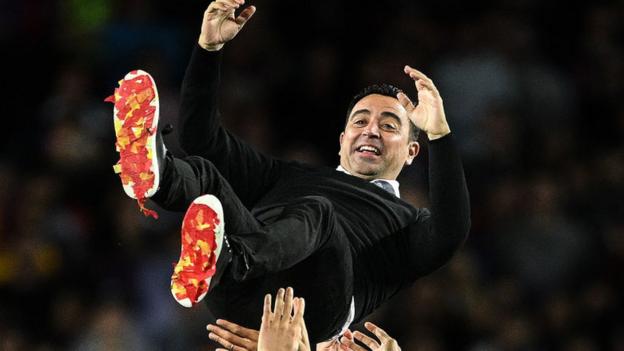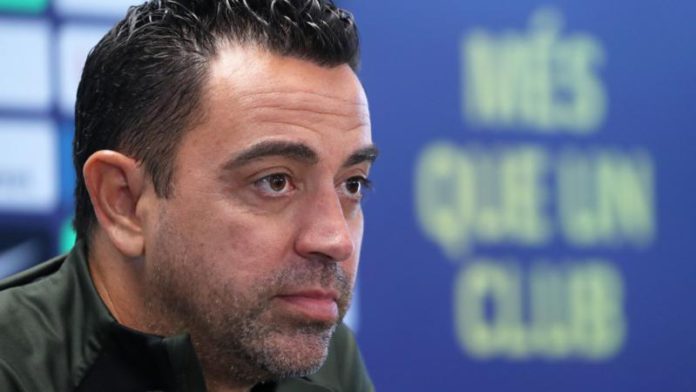To best understand what it is that makes Xavi tick and also why he has already decided this will be his last season as Barcelona boss, it is worth looking back at what happened back in 2008 when Pep Guardiola was appointed as first-team coach.
Then, Xavi had just returned to Barcelona from a hugely successful European Championship that Spain had won and where he had been voted player of the tournament.
But mentally he wasn’t in a particularly good place. There had been no titles in the previous two seasons, a lack of synergy at the club and the disappointment of seeing talented players go to waste.
Xavi did not want to go, but neither was staying an option unless he received reassurances from Guardiola regarding his plans for this most demanding of clubs.
His one-on-one with Pep was as brief as it was defining.
Xavi: “I won’t beat about the bush, Pep. I have one question for you: do you count on me?”
Pep: “I don’t see this team without you in it. I just don’t see this working without you.”
Meeting over; the rest is magnificent history.

Total, unconditional support from his new boss, in fact in some ways the opposite to what he has received since taking over as coach at Barcelona in November 2021, even after winning La Liga in his first full season at the helm.
He became Barcelona boss at the second time of asking, having previously turned down the job after the sacking of Ernesto Valverde in January 2020 – believing it was not the right time to assume the role he became a manager for.
Xavi finally returned as a living legend who was loved by everyone, but he senses now there were doubts coming from the top and from the start.
New president Joan Laporta never really saw him as the ideal man for the post, partly because of Xavi’s links with Victor Font, his main rival for the presidency, but also because he believed that two and a half seasons in Qatar was insufficient training for taking on the task of managing a club like Barcelona.
Laporta even suggested privately Xavi should have gone to Barcelona B, like Luis Enrique or Guardiola had done.
Laporta hired Xavi for a number of main reasons. He was the popular choice and hiring a ‘legend’ is never going to be a bad look for your own profile, given it works as a shield when things do not fully work.
Furthermore, Barcelona’s precarious financial state was so dreadful that none of the top managers in the world at the time, some of them on Laporta’s wish list, were ever going to touch the club.
And things post-Ronald Koeman certainly improved, although comparisons with Guardiola were swiftly dispelled – among other reasons – because Xavi never had the depth of talent that had been available to the now Manchester City boss.
In Xavi’s first full season, though, the team won the league by a clear 10 points.
It was won because of the team’s strength in both boxes but not fully in the style that Xavi or most of the supporters would have wanted. Eleven out of the 28 victories were 1-0 wins and, worryingly, financial difficulties that showed no sign of disappearing meant he could not reinforce the team how he wanted.
Xavi met Erling Haaland but soon realised he was out of Barcelona’s financial league. Bernardo Silva told Xavi he was happy to join Barcelona but again finances made it impossible. Martin Zubimendi was wanted to replace Sergio Busquets, but that was not even negotiated.
So last summer, the squad was revamped with Joao Cancelo and Joao Felix (both players represented by Jorge Mendes, the second of which Xavi did not want). And, instead of the central midfielder the manager wanted, a deal was done for the young forward Vitor Roque, who did not join the team until January.
These days Xavi feels isolated. He lost authority when directors Mateo Alemany and Jordi Cruyff, allies with whom he had a very good relationship, were taken away from him in the summer and in came Deco, closer to the president’s way of thinking.
It has been said Deco shares misgivings regarding Xavi’s ability to do the job and is not afraid to state them privately. But when he meets the manager and they are both next to the president, the support for Xavi is unanimous. Laporta even hopes he can change his mind to remain in the post longer – or so he tells the manager.
Xavi is a ‘Cule’ to the bone, a man who bleeds Barcelona, and it breaks his heart to hear his own children tell him at their school they are saying he is not a good coach. More reasons to step aside.
Despite outward shows of affection from Laporta, incidents over a period of 15 days before Christmas confirmed Xavi’s seat was not solid. Laporta attended a Barcelona B match and the president was quick to tell journalists ‘off the record’ that in the event of Xavi leaving, B coach Rafa Marquez was prepared to take over.
As the weeks progressed, that certainty diminished and there are now doubts the Mexican could take the job but, at the time, the backing was seen as a subtle dig at Xavi.
Then in the Champions League match against Antwerp, despite the manager having already picked his squad, Laporta demanded star names Robert Lewandowski, Ilkay Gundogan and Ronald Araujo, who had originally been rested, should be reinstated. In the end, Lewandowski was in the starting line-up and Gundogan came on in the 60th minute.
More than just the importance of the game – Barcelona were already through to the knockout stages, although not yet assured of top spot – it was the inconceivable suggestion of the president and the reaction of the manager that took people by surprise. A line had been crossed. One can only begin to imagine what sort of response Guardiola might have given if he had been confronted with a similar situation.
Xavi is also finding life requires other priorities from him. He was never going to be a manager for a decade. His family request his time and attention and, in recent times, they have been his biggest obsession. On the pitch, his work in training is not being fully reflected by his team; in fact, they are playing worse than last season. None of that though means he should not be afforded respect while he is manager.
And he feels he is not getting it and has said that a few times in press conferences.
There have been, from inside the camp, complaints regarding his training methods and recently Deco showed up to oversee it in what Xavi saw as another disrespectful slight to his authority.
Xavi, in reality, knew shortly after he had extended his contract until 2025 that his days at the club were numbered; in fact, that he did not want to remain at the job for much longer.
The latest project with a swathe of very talented youngsters coming through the ranks bodes well for the club’s future, but it was not what Xavi originally wanted. The limitation of finances suggests the club should have been talking about building a team for the future, but Xavi, the optimist, insisted he wanted to win all the big trophies and play well.
Xavi has never properly explained exactly why he is leaving. Sometimes he says it is because of the results, at other times because he feels he can no longer take the pressure.
In announcing he would resign at the end of the campaign, he said: “There are many things. I think this is the right moment. The truth is that we are very much alone and the atmosphere is bad, and there are still many things still around from the past, and I think it’s enough.
“We have done good work and the time is now right to leave and look back and maybe that way we can value what we have done. It seems untrue but the Catalans are like that.”
But soon after he said it had nothing to do with mental health, it was all about results. And yet it seems his decision was taken at the start of this season.
Great success as a player does not come with a guaranteed right to attain similar achievements as a coach. Xavi, at the end of his time at the club, will have to ask himself if he wanted it all badly enough.
What of his future?
A stumbling 3-3 draw against lowly Granada on Sunday has racked the tension up at the club and the natives are getting decidedly restless. But, according to sources close to Xavi, these doubts don’t come from all the decision-makers at the club.
Although Laporta initially agreed that Xavi should stay until the end of the season, and he has asked Xavi to rethink his resignation, the likelihood is that if recent form continues the president will be compelled to act.
Barcelona are not at home now until they face Getafe on 24 February, by which time they’ll know how they got on in the first leg of their Champions League last-16 match against Napoli.
With the league realistically lost, much will hinge on the club’s performance in Italy on 21 February, a game that has all kinds of financial, emotional and institutional implications for the club.
Defeat over the two legs would cost the club the €9.6m that comes with making it to the quarter-finals, money the Barcelona board has already budgeted for.
Psychologically, it would be a huge setback for the dressing room that would effectively see an end to their competitive season. Institutionally, it would be a harmful blow to the reputation and standing of Laporta.
Nobody is putting their mortgage on Xavi staying if they lose in the last 16 of the Champions League.

